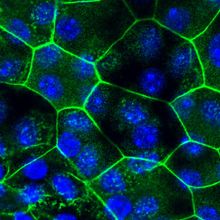DNA methylation

Understanding Cell Type Specific 3D Genome Structure and DNA Methylation
Velsera | Jul 8, 2024 | 1 min read
A robust platform for analyzing 3D genome architecture and epigenomic features enables a deeper understanding of gene regulation in specific cell types.

The Sequencing Revolution
The Scientist | Apr 24, 2024 | 1 min read
Learn how cutting-edge sequencing techniques accelerate basic and disease research.

Epigenetics in a Dish
The Scientist | Feb 27, 2024 | 2 min read
Jonathan Weissman and Luke Gilbert share how they developed several CRISPR-based epigenetic editors and how these tools differ from traditional CRISPR.

Epigenetic Changes Drive Cancer
Rebecca Roberts, PhD | Nov 28, 2023 | 3 min read
An analysis of almost 700 different tumors revealed that DNA methylation drives tumorigenesis just like genetic mutations do.

Epigenetic Marks May Cause Brain Tumor Formation
Jennifer Zieba, PhD | Sep 19, 2023 | 3 min read
Scientists established an epigenetic mouse model for glioma, providing insight into how epigenetics can initiate cancer.

Stress Increases Biological Age, But Recovery Can Revert It
Alejandra Manjarrez, PhD | Apr 21, 2023 | 2 min read
A new study relying on DNA methylation clocks suggests that the biological age of mouse and human cells can fluctuate in response to stressful events.

Bladder ‘Memory’ Influences Urinary Tract Infection Recurrence in Mice
Alejandra Manjarrez, PhD | Apr 12, 2023 | 3 min read
Urinary tract infections leave permanent epigenetic marks in the mouse bladder epithelium, reprogramming its response to subsequent infections, a study finds.

COVID-19 Infections May Reshape Genetic Landscape
Holly Barker, PhD | Mar 30, 2023 | 3 min read
SARS-CoV-2 infection triggers structural changes in the host cell’s DNA, which provide a molecular explanation for long COVID, a new study suggests.

Infographic: Transposable elements in cancer
Diana Kwon | Mar 1, 2023 | 1 min read
Jumping genes are let loose in cancerous cells, with multiple effects on cell health.

Jumping Genes’ Role in Cancer
Diana Kwon | Mar 1, 2023 | 8 min read
Transposons may be key players in how tumors develop and spread, but they also keep cancer at bay in some circumstances.

Mice Pass Epigenetic Tweaks to Pups
Katherine Irving | Feb 17, 2023 | 5 min read
An engineered methylation pattern persisted for four generations of mice, demonstrating transgenerational epigenetic inheritance can occur in mammals.

Epigenetic Manipulations Can Accelerate or Reverse Aging in Mice
Alejandra Manjarrez, PhD | Jan 12, 2023 | 4 min read
Repairing damaged DNA appears to drive aging by causing the loss of epigenetic information, but restoring that information reverses such effects, a study finds.

Infographic: How Epigenetic Marks Can Change the Genome
Katarina Zimmer | Nov 1, 2022 | 2 min read
Although epigenetic changes were long thought to largely act on the genome, rather than as part of it, research is now showing that these patterns can, directly or indirectly, change the genetic code.

Do Epigenetic Changes Influence Evolution?
Katarina Zimmer | Nov 1, 2022 | 10+ min read
Evidence is mounting that epigenetic marks on DNA can influence future generations in a variety of ways. But how such phenomena might affect large-scale evolutionary processes is hotly debated.

Methylation in Young Brains May Be Key to Obesity: Mouse Study
Alejandra Manjarrez, PhD | Oct 19, 2022 | 4 min read
Epigenetic events, such as methylation, during early brain development in mice occur in genomic regions associated with BMI in humans, according to a new study.

Brush Up: What Is Bisulfite Sequencing and How Do Researchers Use It to Study DNA Methylation?
Deanna MacNeil, PhD | Sep 15, 2022 | 4 min read
Prior to DNA methylation sequencing, researchers treat their samples with sodium bisulfite to distinguish methylated cytosine from unmethylated cytosine.

Infographic: Questions Linger About Epigenetic Inheritance
Catherine Offord | Apr 4, 2022 | 3 min read
Some studies suggest that associations between the health of children and the experiences of their parents or grandparents may be due to epigenetic mechanisms, but confounding factors challenge this interpretation.

Does Human Epigenetic Inheritance Deserve a Closer Look?
Catherine Offord | Apr 4, 2022 | 10+ min read
The concept of epigenetic inheritance has long been controversial. Some researchers hope that new data on cross-generational effects of environmental exposures will help settle the debate.

DNA Methylation Could Predict Ovarian, Breast Cancers
Anna Napolitano, PhD | Feb 11, 2022 | 5 min read
A pair of new studies finds that analyzing material from a Pap smear can reveal tumor risk in distant parts of the body, potentially allowing early interventions.
